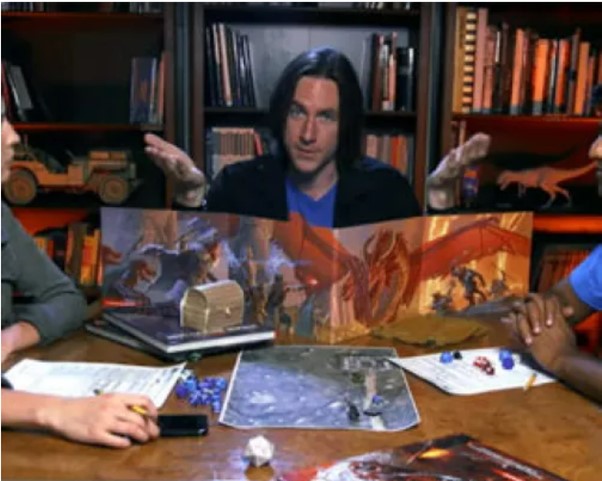In the Dungeons & Dragons (D&D) role-playing game, the Dungeon Master (DM) is the game organizer and participant in charge of creating the specifics and encounters of a game session, while maintaining a realistic continuity of events.
If you’ve ever found yourself enchanted by the world of tabletop roleplaying games, you’ve likely heard whispers of the enigmatic figure known as the Dungeon Master. But what exactly does a Dungeon Master do, and how can you embark on this thrilling journey yourself? Let’s delve into the depths of this captivating role and uncover some tips for aspiring DMs.
Deciphering the Dungeon Master’s Role
At its core, the Dungeon Master serves as the architect, narrator, and referee of the game experience. Here’s a closer look at the multifaceted responsibilities that come with the title:
1. World Building
One of the DM’s primary duties is to craft a rich and immersive world for players to explore. From sprawling cities to treacherous dungeons, every corner of the realm is yours to shape and mold.
2. Storytelling
As the master storyteller, you’ll weave together narrative threads, concocting tales of heroism, intrigue, and peril. Your words breathe life into the world, painting vivid pictures that captivate the imaginations of your players.
3. Roleplaying
Channeling a cast of colorful characters, both allies and adversaries, is a cornerstone of the DM’s role. From grizzled mercenaries to cunning villains, you’ll don a variety of hats to bring the world to life.
4. Rule Adjudication
While the rulebooks provide a framework for gameplay, it’s the DM’s duty to interpret and enforce these rules. Whether resolving disputes or improvising on the fly, you’ll act as the final arbiter of the game’s mechanics.
5. Fostering Creativity
Above all else, the DM is a catalyst for creativity, inspiring players to embark on epic adventures and forge unforgettable memories together.

Tips for Getting Started as a Dungeon Master
I remember returning to DMing after a long break. It felt daunting and nerve wracking. But as soon as we started and I could see that all of us were having fun all my fears evaporated. While not easy, embarking on your journey as a Dungeon Master is extremely satisfying and worthwhile. With a bit of preparation and a sprinkle of courage, you’ll be well on your way to crafting legendary tales. Here are some tips to help you get started:
1. Start Small
Begin with a simple one-shot adventure or pre-made module to familiarize yourself with the basics of DMing. As you gain confidence, you can gradually expand your repertoire and tackle more ambitious campaigns.
Don’t worry too much about world building. Beginning with a small village with a haunted castle nearby is enough to start with. You can then expand your world together with the players as you go.
2. Know the Rules (But Don’t Be Afraid to Bend Them)
Familiarize yourself with the rules of your chosen game system, but don’t let them constrain your creativity. Remember that storytelling takes precedence, and it’s okay to bend or modify rules to serve the narrative.
During my 5 + years D&D campaign I relied heavily on the players knowledge of the rules. If I didn’t know I’d ask. As DM, I still had the final word on a rule. However, playing this way definitely made the game feel even more collaborative. So don’t worry if you don’t know the rules word for word.
3. Embrace Improvisation
No matter how meticulously you plan, players will inevitably throw curveballs your way. Embrace the chaos and hone your improvisational skills, ready to adapt and react to unexpected twists and turns.
In fact, this happens to me every single session. It’s all part of the fun. Not knowing what’s going to happen makes the game even more exciting for the DM and players alike.
4. Communicate with Your Players
Establish open lines of communication with your players, soliciting feedback and addressing any concerns or expectations they may have. Collaborate with your group to ensure everyone is on the same page and having fun.
A good friend of mine periodically sends his players surveys. This lets him capture direct feedback from the players away from the table. He then adjusts his game removing any niggles that the players might have. This is something I’m intending to do for my own games in the near future.
5. Learn from Experience
Like any skill, mastering the art of Dungeon Mastering takes time and practice. Don’t be discouraged by setbacks or mistakes. Instead, view them as learning opportunities to grow and improve as a storyteller.
I’ve made lots and lots of mistakes as a DM. But we’re all there to have fun. As such my players are all very forgiving. Remember, everyone at the table has a role in making the game enjoyable and memorable. It doesn’t fall on the shoulders of the DM alone.
Final Thoughts on Dungeon Mastering
For me there is nothing more satisfying and rewarding than running the game. Helping spark players creativity and helping lead them through adventures is a fantastic experience. As I’ve shown above it’s not that difficult to get started. Grab a rulebook or started set, a couple of interested friends and you’re off.
What’s holding you back from giving it a go?

